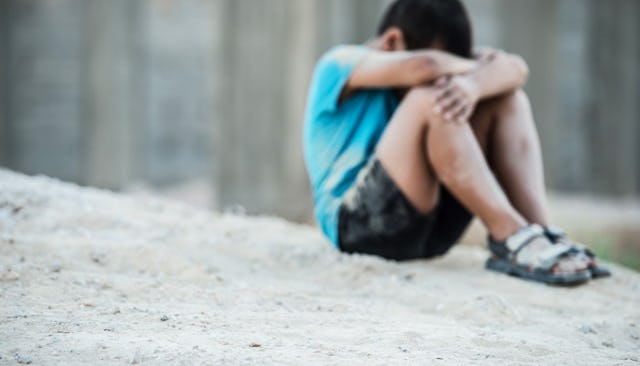Teaching Our Children About Suffering And Empathy

Shaking the steering wheel slightly, I turn the volume dial down until I can no longer hear the collected, serene voice of the NPR newscaster. I try to reconcile what I’m seeing—a sunrise unveiling a perfect fall morning, the image of my sleeping son in my rearview mirror—with what I’m hearing—a report on thousands of terrorized refugees fleeing Syria, and a country’s speculation over which area to bomb. Though the car is now silent, my thoughts are laboriously piecing together the information I had read previously about horrific, violent events occurring in the Middle East, and I found myself staring at the everlasting white highway lines pondering a familiar question:
Why on earth did I bring a child into this world?
As white, middle class Americans, apathy is my family’s privilege when it comes to violence and suffering. We have been largely unaffected by the perils of hunger, poverty and war. Between work, a marriage, trying to keep up with friends and family, battling anxiety and showdowns with a toddler over using the potty, there is not much emotion to spare beyond the walls of my self-absorption. Add to this the ease of turning a blind eye—not watching the news or getting on Facebook—and I can live in a blissfully ignorant bubble for a while. Beyond being a mother, though, I am a person. And whether I go to work in a low-income school or turn on the radio to hear news reports of destruction, I cannot close my heart to the gravity of despair people are facing.
It’s not just that I don’t want to set a bad example for my son. It’s that numbing myself to the pain of other people feels wrong. I do not apologize for being aware of and caring about the fact that from my street corner to the corners of the world, people are suffering due to racism, homelessness, violence, loss and countless other torments. I struggle intensely with how to talk to my son about the world’s afflictions. There is a natural urge to protect my child, to shield him from the knowledge that the world can be ugly and cruel. There is also an instinct to ignore unpleasant realities, to suppress my anger, to mind my own business and let others sort injustices into piles of good or bad.
As a mom, however, my job is not to shelter my child from this knowledge. My job is to prepare my child with foresight, to love him fully, and to show him that if he chooses to act, he can change the way things are. I cannot leave my family and sign up for a peacekeeping mission, but I can lead my family in treating the people around us with kindness and understanding. I can talk openly with my son about violence and oppression. I can listen to his questions, his thoughts and his feelings without claiming to have a definitive solution. I probably won’t be his best friend, but I will be there when he struggles with how to make sense of the complexities of life.
My son, who is only 2, does not yet understand the questions I have. He cannot question why he was born in a wealthy country when others are born in the midst of chaos. He doesn’t grapple with his unintentional role in the systematic oppression of people of color. He cannot wrestle with the idea of people claiming to be “pro-life” while simultaneously advocating for air strikes. Unlike his mother, he does not feel the dread about the seeming lack of answers for what can be done to make the world better.
Someday, I hope my son feels this torment on behalf of his fellow humans, and although his efforts might cost him comfort, I hope he chooses to fight it.